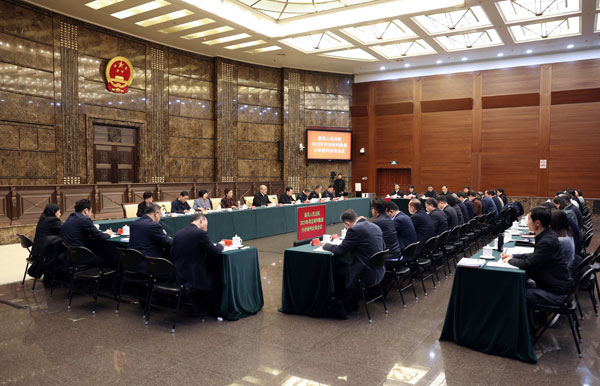SPC holds consultation meeting on 2023 judicial adjudication data analysis

On Jan 29, the Supreme People's Court (SPC) holds a consultation meeting on the analysis of the 2023 judicial adjudication data. Zhang Jun, president of the SPC, presides over the meeting. [Photo/court.gov.cn]
On Jan 29, the Supreme People's Court (SPC) held a consultation meeting on the analysis of the 2023 judicial adjudication data. Zhang Jun, president of the SPC, presided over the meeting.
Since April 2023, the SPC has conducted quarterly consultation meetings on adjudication data analysis, during which members of the SPC leadership and heads of adjudication divisions focus on any atypical data, study them in terms of geography, crime category and case category, analyze causes and propose measures to form concrete work arrangements.
Statistics show that the quality, efficiency and effectiveness of adjudication work has witnessed significant improvement in the past year, with 21 items out of 26 in the adjudication quality control index system seeing year-on-year improvement. Notably, the rate of second instance adjudication increased by over 10 percentage points; the settlement rate within the trial limit increased by nearly two percentage points; the average case conclusion time decreased nearly seven percent; the pre-litigation mediation success rate increased over four percentage points; and the enforcement delivery rate increased nearly four percentage points.
There were also disconcerting figures, for instance, applications for retrial increased by 0.14 percentage points, and applications for the enforcement of pre-litigation mediation settlements increased by nearly two percentage points. Those figures reflected a deficiency in the substantial resolution of disputes, which was a focus of the consultation meeting, mulling countermeasures.
At the meeting, Zhang raised the requirement that courts at all levels should actively engage in litigation-source governance, which is vital in promoting socioeconomic development and maintaining stability. Courts should reinforce coordination with other departments involved in the central-level coordination mechanism based on local conditions, continue to improve their capacity in dispute prevention and resolution, and put judicial suggestions into practice so as to jointly improve governance of related industries and reduce disputes at the source.
Efforts are needed to manage adjudications in line with judicial rules. Courts are required to make good use of the adjudication quality control index system, which was enacted in January, and ensure the system is more targeted by including indicators catering to local conditions. Consultation meetings are needed to summarize work and put forward improvement measures. Accountability needs to be specified so that every judge will be well aware of their duties.
He also stressed the need to prioritize both political integrity and professional capability, and highlighted the importance of the implementation of court work plans.







